How close can we ever get to Brahms? Trawling through an immense bibliography of research, one entry stopped me in my tracks. I had grown up loathing and despising his music, reeking of sanctimony and any professions of discomfort were quashed with implications of your having emotional or cultural deficiencies. Their smug piety didn’t offer an escape for my migraines. But here, an obscure author, one Arthur Abell, had produced a book probing the internal landscape of the elusive taciturn composer. It contained lengthy passages that assaulted the eye with their detailed discourses on spirituality, inspiration, the act of creation. Not only did Brahms quote from the Bible, but he backed his quotes with chapter and verse the way measure numbers are bandied about in rehearsal. And so did his colleague Joseph Joachim who was in the room with him, bantering away as they rounded out a double perspective that often found them in harmony, as sympathetic as their lifelong musical synchronistic collaborations.
Brahms credited divine intervention for inducing sounds that were channeled through his being and fashioned into pieces. Perhaps this was a clue to his inner creativity. He turned to Joachim as said: “Of course, to the disciples it appeared that Jesus was walking on the water, but in reality, He was walking in the air. His spiritual power was so great that He could, by drawing on Omnipotence, rise superior to the Law of Gravitation. We call that a supernatural power but supernormal would be a better term. Jesus was utilizing a higher law of which his disciples in the boat were all ignorant, and their only explanation was that He had supernatural powers, being God Himself personified. Nevertheless, their terror was very great for we read in Matthew 14:26, ‘And they cried out for fear.’”
Joachim instantly replies: “I am convinced of it and also that He knew that others could have the powers of levitation if they could operate that higher law as He did; otherwise how do you explain John 14:12?”
I was left speechless at this unexpected entanglement in their quest to explain how the creative process serves as a part of mystical contact with forces that could only be accessed by pure souls who kept themselves open for divine visitation. Their command of and familiarity with biblical passages and shared vision was unlike anything I had ever encountered or expected to find in a musician’s memoirs other than Messiaen. And how did this unique document come into being? Abell, the author, had served as a music correspondent in Berlin starting in 1890 and, although fluent in German, secured the services of a “bi-lingual stenographer” from the American Embassy in Vienna, who accompanied him to accurately notate a conversation with Brahms and Joachim that lasted for three hours. One could understand how the uniqueness of such an occasion couldn’t be compromised through any imprecision or loss of their precious comments, so an accurate transcription was carried out.
The resulting book, Talks with Great Composers, appeared in 1955: Abell’s preface reveals a promise given to Brahms that his innermost comments would not be made public until half a century after his passing, and Abell honored his request.
As my ears withered under the torture of Brahms performances, so did my eyes and focus as the text meandered into its esoterica, with both voices echoing similar perceptions, until they mentioned one Haekel as a source of ideas and opinions. The sound of this name shook away the torpor by evoking an unwholesome vision of this pair, a most inappropriate and vulgar digression from their charting a path to enlightenment:
After the Bible had been parsed by the two masters, they turned their attentions to a contemporary British writer Alfred Lord Tennyson, whose passages were as endearing to them as the New Testament. For some reason I just could not shake off this Haekel, which must have intended another Heckel:
And with a stenographer on hand, how could this error slip by an author who interspersed his work with German quotes to demonstrate his acumen in capturing whiffs of flavor from a revelatory spiritual banquet he fully translated into English?
Admittedly I had heard piano recordings in 1979 by Etelka Freund (1879-1977), a Hungarian musician who became Brahms’s pupil when she left Budapest to study in Vienna at age fifteen. Although she lived in New York after 1946, no one had interviewed her. Many considered her playing to be eccentric, in its cavalier disregard of the strictly notated rhythms and her shifting around a singing tone and phrasing it to trash any suggestion that bar lines had even existed or were necessary. Such nerve!
Scherzo from Brahms’s Sonata op. 5
It was contrary to Brahms, Brahms and his interpreters, the thousands of pages of his music pouring forth from printing presses, the deluge of large and small works in concert halls throughout the globe, the thousands of recordings kept at home and aired on media, the writings, the scholarship, theoreticians slaving over the hidden structure of his constructions, and people singing in the shower!
Her son Nicholas Milroy (seated on right) pulled out an unpublished manuscript written by his uncle Robert, who had been a close friend of the composer. Robert Freund also was close to Friedrich Hegar and Gottfried Keller, Swiss writers whom Brahms highly esteemed, as well as Nietzsche, so one could surmise that weighty and insightful conversations would have transpired during nearly two decades of their friendship. Freund writes of his friend’s visits to Budapest in the 1880’s:
“I called for [Brahms] daily at 2 p.m. at the Cafe Hungaria, and once, when I was late, he appeared immediately at my door after two. We went on walks, ate dinner together, and wandered up and down the Danube until near midnight. I was of course completely taken with the [second] piano concerto (then still unpublished), especially its last movement, and even though I didn’t say much, Brahms knew exactly how I felt. For hours we walked side by side without uttering a word. At times, however, he became talkative and reminisced, mostly of his younger years.”
While there wasn’t time to discuss philosophy with Freund, Abell mentions how he evoked Brahms’s memories of Sitting Bull: “I first saw Sitting Bull’s name in print in the account of the Custer massacre in June 1876. I well remember that year because I was putting the finishing touches on my first symphony.” Abell regailed Brahms with tales of the chief being presented at court to Queen Victoria, with Brahms’s urging the writer on: “That is a capital story and I insist on your telling it in your book!”
A day after picking up the book, stumbling over the magpies and comparing Freund’s description to the ongoing banter of the text, a recording arrived of a BBC radio talk given in 1949 by Edith Heymann, a pianist who knew Brahms through her teacher Clara Schumann. Keeping in mind Brahms’s stinging wit and thorny character, I was surprised to hear this about someone whom Abell presented as an expert on Tennyson and other British writers:
As much of Brahms Inc. shunned Freund and anyone else who played in her remote style, I wondered how academics covered Abell’s revelations.
A British critic reviewing for an Oxford University journal in 1965 seems to equivocate between admiration and hinting at an underlying peculiarity:
“As for the remaining talks with Strauss, Puccini, Humperdinck, Bruch and Grieg, the author claims that their remarks are preserved word for word in his English translation, and occasionally (for verisimilitude?) he throws in a handful of words in the original language. It is no doubt the process of translation or perhaps the elevated tone of the discussions as a whole that gives a certain similarity of style to the various utterances recorded here. Occasionally we meet identical turns of phrase: Joachim speaks of Beethoven as ‘a crescendo of Mozart’, and Strauss refers to Brahms as ‘a crescendo of Beethoven.’ Brahms declares ‘No atheist has ever been or ever will be a great composer’, and later in the book Richard, I mean Wagner, tells Engelbert, I mean Professor Humperdinck: ‘No atheist has ever created anything of great and lasting value.’ The book abounds in misprints, but these and the misquotations are small blemishes on a unique work. No reader attracted to the book for whatever reason is likely to be deterred by minor details of this sort, though there may be some who will feel that at 25s, this is rather an expensive entertainment.”
Decades later a California-based Brahms specialist surmises in a Cambridge University reader: “Although Abell might well have take some liberty with Bruch’s remarks there is no reason to doubt the general accuracy of the composer’s ideas. (Abell’s recollections of Brahms himself have always been treated with some reserve by Brahms scholars, since he provides information of a kind Brahms hardly ever vouchsafed even to his intimate circle, and because of the ‘psychic’ orientation of the writer.)”
And another sighting of Abell came as recent 2000, courtesy of a Cambridge review:
“Curiously, there is no discussion of the work of Arthur Abell who directly asked composers about their inspirations and recorded their replies in his book, Talks with the Great Composers (1955).”
Nicholas Milroy was ten years old when he snapped a photo of Fanny Davies while he and his family bumped into her by the Rigi in the Swiss alps. She had been very close to Clara Schumann and Brahms, a proponent of his music as a new experience and an eager champion of Janacek and other composers who followed. Davies immediately recognized Freund after decades had passed and addressed her: “You are a true member of our inner circle.” (photo: l. Davies. ?, janacek, Adila Fachiri).
After Abell’s decease in 1958 at age 90 his archive was bequeathed to the New York Public Library. Checking through the documents and finding aid for the stenographer’s transcription of three hours with Brahms and Joachim the librarian and myself noted that not one item pertained to Brahms, except for a Florida newspaper clipping that Abell had filed thirty years after the composer’s death that was expanded and regurgitated into a final salvo.
Allan Evans ©2014

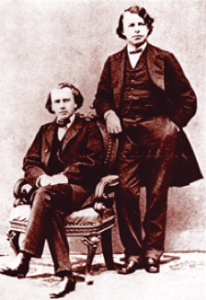


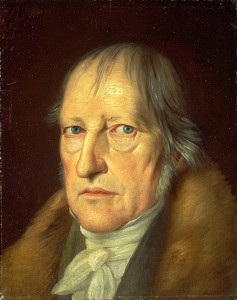

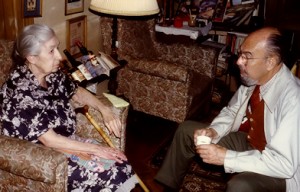
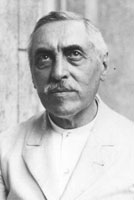

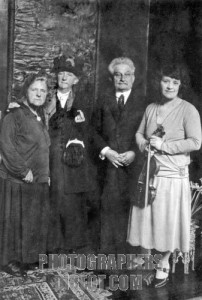
Busted!